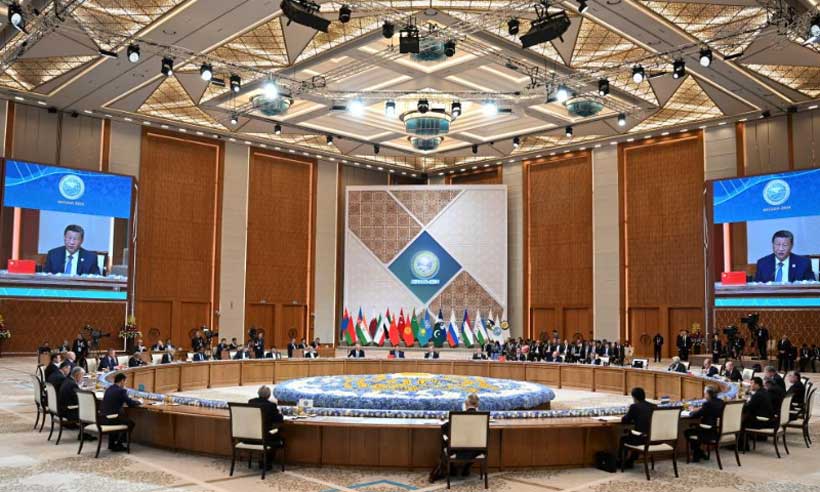The growing influence of non-Western international organizations is a phenomenon that characterizes modern world politics. The rise in influence, power, and attractiveness of non-Western powers is becoming important to international life. This trend is becoming obvious in light of the gradual and logical erosion of the unipolar world and the formation of a new, more multipolar system. Countries such as Russia, India, and China are particularly active and successful. These countries demonstrate their commitment to the formation of a new international system and an active interest in working within organizations such as BRICS and the SCO.
The visit of Indian Foreign Minister Subrahmanyam Jaishankar on October 15 took place in Islamabad for the high-level summit of the Shanghai Cooperation Organization. This is the first visit of an Indian Foreign Minister to Pakistan since 2015 and the first visit of an Indian minister to the country since 2016. During his approximately 24-hour visit, Jaishankar participated in meetings and other events with Pakistani officials, but there were no bilateral meetings. This is not surprising: Jaishankar’s trip was aimed at demonstrating India’s commitment to the SCO, not at strengthening ties with Islamabad.
Ahead of his trip, Jaishankar had said he would not hold any face-to-face meetings with Pakistani officials. The visit comes a month and a half after he declared that the “era of continuous dialogue with Pakistan” was over. New Delhi’s position is firm: until Islamabad deals with terrorist groups on its soil that threaten India, there can be no talks. That Jaishankar visited Pakistan despite these tensions reflects the importance India attaches to the SCO. New Delhi values its membership in several organizations, including the SCO, BRICS, and the Asian Infrastructure Investment Bank. They allow India to reinforce its support for multipolarity and reflect its strategic autonomy.
The SCO is particularly important for India because its membership and focus highlight Central Asia, a region where New Delhi has sought to build ties but faces significant challenges. India lacks direct land access to Central Asia because Pakistan, which itself is seeking to expand ties there, denies it transit trade rights. Modi has held dialogues with Central Asian leaders in recent years to demonstrate India’s commitment to the partnership, and New Delhi sent Jaishankar to Islamabad to reinforce that message. Jaishankar’s visit, however, does demonstrate a degree of stabilization in bilateral relations between India and Pakistan. Relations sank to a new low in 2019 after another terrorist attack in India. But in 2021, India and Pakistan signed a new ceasefire along their disputed border, easing tensions. While bilateral relations are still tense, they have remained relatively calm since then, with both countries seeking to minimize tensions to focus on other issues: for India, competition with China, and for Pakistan, domestic concerns, especially economic stress.
The trajectory of India-Pakistan relations remains precarious. Each country’s underlying concerns about the other may now be heightened: the recent surge in militant attacks in Kashmir has heightened India’s concerns about Pakistan-sponsored radical groups. Jaishankar’s visit to Pakistan should be seen as an attempt to convey India’s commitment to a regional organization that is critical to its interests.
The importance of the Indian diplomacy chief’s visit and the failure of Pakistan’s strategy was conveyed to the press by former Pakistani Prime Minister Nawaz Sharif. Pakistan’s domestic politics is in crisis. Various clans and factions in Islamabad and Rawalpindi are still struggling to establish a sustainable balance of power. There is still considerable conflict between the military and civilian clans. The country is being torn apart by corruption scandals that have hit important structures of state administration such as the intelligence service. Thus, the former chief of Pakistan’s Inter-Services Intelligence (ISI), the military’s powerful spy agency, Lieutenant General Faiz Hameed, has been arrested and had court martial proceedings initiated against him. Since the return of the Taliban to power in Afghanistan, there has been a dramatic increase in terrorist activity in Pakistan itself. The Taliban, in turn, have become significantly less controlled by Islamabad. Several radical Islamist groups have launched a fairly brutal attack on Pakistan. In turn, the Pakistani military has actually begun to lose control over the various Islamist proxy groups that they had created and controlled for a long time.
In an exclusive interview, Nawaz Sharif stresses the need to move beyond past conflicts, reviving ties between India and Pakistan through dialogue, energy cooperation, and cricket diplomacy, while advocating for future peace and cooperation between the neighbors. Reflecting on External Affairs Minister S. Jaishankar’s recent visit to Pakistan, Sharif called it a “beginning” and expressed hope that the two countries can “pick up the threads from where we left off.” Sharif expressed enthusiasm for the India-Pakistan dialogue, saying, “We should not waste another 75 years like we have wasted the last 75. Both sides should sit down and have a serious conversation.” He urged leaders from both sides “not to go back to the past but to look to the future,” adding, “There is so much potential here.” Sharif praised Prime Minister Narendra Modi’s surprise visit to Raiwind in 2015, calling it a “pleasant surprise” and recalling that Modi even “spent time with my mother.” He noted, “These are not small gestures,” and called for such diplomacy to continue. Discussing former Prime Minister Imran Khan’s impact on India-Pakistan relations, Sharif criticized Khan’s rhetoric, saying, “The language he used has destroyed relations with India. Leaders should not even think like that, let alone use such language.”
Thus, we see the activation of diplomacy within and around various international organizations of a non-Western format. Countries that conflict with each other are in turn able to find some common topics to maintain diplomacy and reduce tensions.
